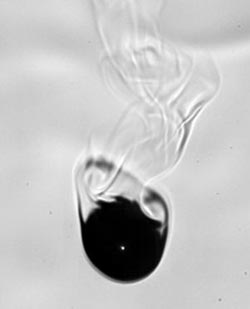The fascination of the droplets

Results of numerical and experimental investigations of falling droplets under various, extreme environmental conditions (high environmental temperature, high environmental pressure)<br><br>University of Stuttgart (ITLR)<br>
The German Research Association (DFG) has granted the University of Stuttgart the right to continue the transregional special research field 75 (SFB-TRR 75) on the topic of “droplet dynamic processes under extreme environmental conditions“.
In this Transregio Stuttgart researchers cooperate with the Technical University of Darmstadt and the German Aerospace Centre (DLR) in Lampoldshausen. The spokesperson is Prof. Bernhard Weigand from the Institute for Thermodynamics of the Aerospace Centre at the University of Stuttgart. The financing for 2014 is 2.2 million Euros and 1.7 million Euros respectively for each of the following three years.
With the extension two new projects and one to date associated project will also be included in the funding. With this the Transregio will be able to increase its profile in the field of numeric fundamentals as well as in the numeric and experimental investigation of flash boiling processes in rocket combustion chambers. In the assessment of the special research field September 2013, the experts were able to assess the excellent cooperation of the scientists at the three involved locations.
All on-going and new part projects convinced the experts with their quality. Therefore, no projects will be cancelled after the first phase of the SFB-TRR 75 but three will be added. The decision was made on 21st November at the selection meeting in Bonn at which the experts made their selections to fund 32 applications from a total of 39 nationwide applications.
Prof. Wolfram Ressel, Rector of the University of Stuttgart, thanked all those involved in the transregional research field for their successful commitment and underlined: “The DFG decision confirms once again the internationally high level of basic research in the field of aerospace at the University of Stuttgart. This success strengthens our hope of being able to establish a further special research field at our university.“
Droplets in nature and technology
Droplets play a central role in many areas of nature and technology. The basic understanding of droplet dynamic processes is hereby decisive for the improvement of technical systems or the better prediction of natural processes. Many of these processes take place under extreme environmental conditions and are already being applied in technology although there are still big gaps in the fundamental understanding of the processes. And this is precisely where the Transregio now comes into play. The objective is to acquire an in-depth physical understanding of these processes. Based on this, methods of describing these processes in an analytical and numeric way should be shown and these also naturally implemented. In addition, this will also help to improve prediction of larger systems in nature or in technical systems. The findings made are to be used in an exemplary manner for five selected systems as “leading models”. Comparisons of the predictions with the actual behaviour of the systems serve the purpose of a continuous critical review of the findings of the investigations. After the focus of the SFB-TRR 75 was on the underlying processes of individual droplets in the first funding phase, the Transregio in the second phase will focus on small droplet groups and compound droplets that are all oriented along the selected leading models.
Further information:
Dr.-Ing. Andreas Birkefeld, University of Stuttgart, Institute of Thermodynamics of Aerospace, Tel. 0711/685-62334, Email: andreas.birkefeld [at] itlr.uni-stuttgart.de
Dr. Hans-Herwig Geyer, University of Stuttgart, Head of University Communication and Press Spokesperson,
Tel. 0711/685-82555, Email: hans-herwig.geyer [at] hkom.uni-stuttgart.de
Media Contact
More Information:
http://www.uni-stuttgart.deAll latest news from the category: Physics and Astronomy
This area deals with the fundamental laws and building blocks of nature and how they interact, the properties and the behavior of matter, and research into space and time and their structures.
innovations-report provides in-depth reports and articles on subjects such as astrophysics, laser technologies, nuclear, quantum, particle and solid-state physics, nanotechnologies, planetary research and findings (Mars, Venus) and developments related to the Hubble Telescope.
Newest articles

You are What You Eat—Stanford Study Links Fiber to Anti-Cancer Gene Modulation
The Fiber Gap: A Growing Concern in American Diets Fiber is well known to be an important part of a healthy diet, yet less than 10% of Americans eat the minimum recommended…

Trust Your Gut—RNA-Protein Discovery for Better Immunity
HIRI researchers uncover control mechanisms of polysaccharide utilization in Bacteroides thetaiotaomicron. Researchers at the Helmholtz Institute for RNA-based Infection Research (HIRI) and the Julius-Maximilians-Universität (JMU) in Würzburg have identified a…

ASXL1 Mutation: The Hidden Trigger Behind Blood Cancers and Inflammation
Scientists show how a mutated gene harms red and white blood cells. LA JOLLA, CA—Scientists at La Jolla Institute for Immunology (LJI) have discovered how a mutated gene kicks off…



